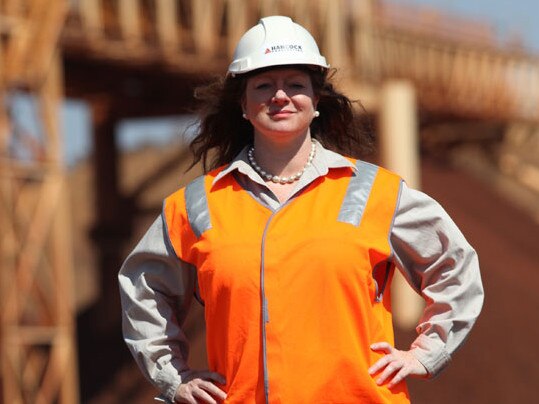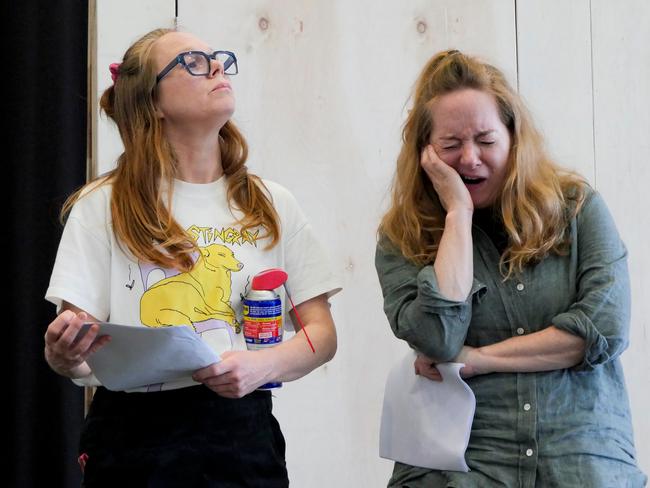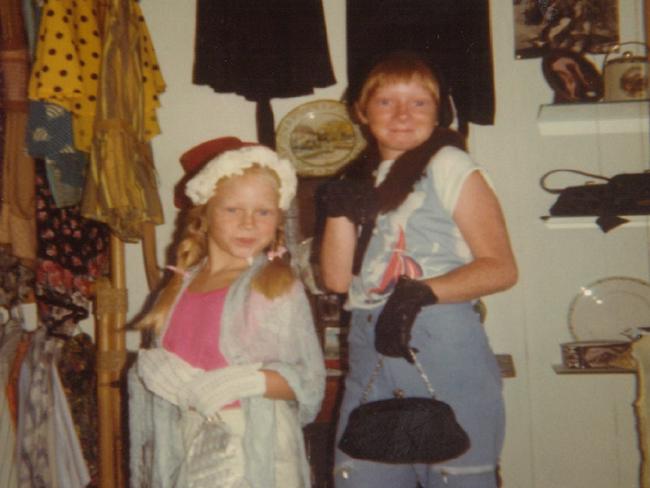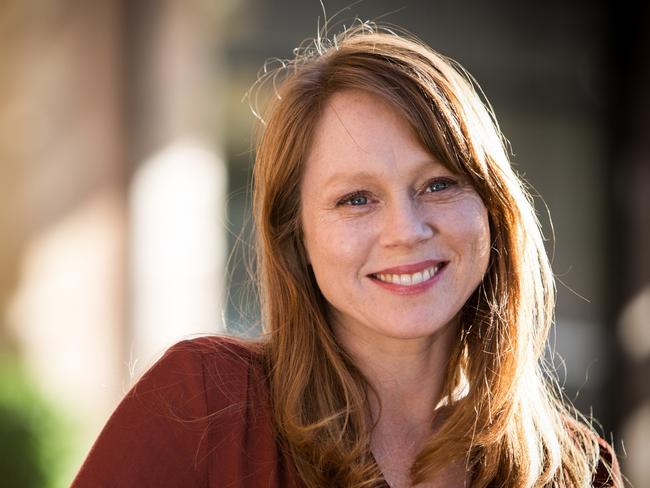Mandy and Hayley McElhinney appear in Dirty Birds at Perth’s Heath Ledger Theatre
Sisters Mandy and Hayley McElhinney at last are appearing on stage together in their own play.

In the end it took the strictures of a grumpy old playwright and the enforced separation caused by the global pandemic to bring sisters Mandy and Hayley McElhinney together on the same stage at the same time.
Mandy, 53, and Hayley, 49, grew up regional Western Australia and Perth, and have made their careers as actors in individual stage and screen projects.
The sisters are used to viewers being confused about which one is which. Mandy is best known for her comic, slightly frowzy roles – not least “Rhonda” in long-running insurance ads on TV – and for playing Gina Rinehart opposite Sam Neill in The House of Hancock. Hayley, just as funny as her sister, is noted for her drama chops on stage with Sydney Theatre Company, TV’s Doctor Doctor and in cult horror film The Babadook.
For the first time, they are appearing together this month in a new play of their own devising. Dirty Birds is a comic double-act, with Mandy and Hayley as two women – sisters, companions, bag ladies, two sides of the same misshapen coin, it’s not clear which – living together in one small space.
The way they describe it, Dirty Birds is a kind of absurdist comedy with an existential edge. It sounds a bit like something from Samuel Beckett, but more on that later.

The play is being produced in their home town, Perth, by Black Swan State Theatre Company, and is directed by new artistic director Kate Champion. The sisters both have appeared on that stage recently – Mandy in The Glass Menagerie, and Hayley in Oil – but not at the same time.
Why has it taken so long for them to do a project together?
“Ask the casting directors about that,” Mandy says on a Zoom call, sitting next to her sister. “We’ve wanted to for a long time.”
“Surely a director’s going to say, ‘Yes, I want them both’, and that’s never happened,” Hayley chimes in. “So we thought, let’s find a play to do. And in looking for plays, we couldn’t find anything that really suited us both. It was during Covid and Mandy was in Sydney and I was in Perth. We started getting together once a week and started writing our own play … We realised that we were creating something for ourselves, and no other play was doing that. So it made sense to us to make our own show.”
They hit on the idea of a two-hander, playing what Mandy calls “these two big open-hearted losers” whose lives are decidedly out of step with the rest of the world. “They are in awe of things that are bigger than themselves – they’re a bit confused and a bit lost at the ridiculousness of life,” Mandy says.

“Our idea was that they are very isolated, and theirs is a very interior world. They are two women who are in a house and they have to find the courage within themselves to step out the front door. That is literally the plot, that is literally the idea that we both had. It may seem flimsy but it really speaks to us, being the age we are now. (The reason) we haven’t done this before is because we do keep questioning ourselves – we’re very hard on ourselves – and that can lead to a kind of paralysis.”
What has held them back?
“Self-judgment, really,” Hayley says. “Inner voices that say, ‘You can’t, you’re not as good as, you’re not able to’,” Mandy says. “You can think your way out of doing things and find lots of reasons not to. And that can stop you from living and taking risks.”
The play is also an attempt by the sisters to come to grips with their Irish heritage. They are the daughters of Rosemary and Andrew, an Irishman who emigrated to Australia as a young man from County Donegal.
“He never went back, though,” Hayley says. “He left a very harsh place, and he was running away from a lot of hardship that he went through when he was a child. (For us) it was a kind of mythical place. He would talk about the green, and all that.
“But when Mandy and I went back to see where he was living, it wasn’t like that at all. That’s our Irish heritage, and we are exploring that in the show: this idea of putting on an identity, pretending to be something you’re not.”
Part of the girls’ early childhood was spent living in a caravan park in Leeman, a fishing town on the WA coast 270km north of Perth. The idea was that the family would do a trip around Australia, but they settled in Leeman where their father worked as a fisherman. The girls loved the social interaction with other families there and the sense of free play that came with their semi-itinerant lifestyle.

“In the caravan park, there were always other families, lots of parties – it was a really social place,” Hayley says.
“For the itinerant life of the actor, it’s actually been good training – to make a home wherever you go,” Mandy says. “That’s fed into the play, as Hayley was talking about. It’s us trying to understand where we belong and who we are. We had this fantasy that we actually belonged in Ireland – but where we grew up was windy, hot and harsh, and we were these pale little kids.”
“Like an introduced species,” Hayley says.
“If your cultural heritage belongs to a place you have never actually been to, all the way on the other side of the world, is that who you are, or is that a construct?” Mandy says.
Do the sisters feel at all Irish?
“No, not really,” Hayley says. “It’s so interesting – a lot of what we are exploring in the show is about identity, and what it means to be Australian as well. The idea of finding connection to this land and working with the land rather than against it: that’s something we are hearing more and more. I feel Australian, but I’ve been grappling with our cultural heritage, to figure out who we are.”
“Part of the reason we were attracted to being actors is that we are trying on all these different characters – in a weird way, searching for the authenticity of ourselves,” Mandy says. “I can say that this is still a question for us – and that doing this play has helped us work out who we are, where we belong.”

The sisters had been working on their ideas for the play with Colm O’Callaghan, an Irishman who was formerly a producer at Sydney Theatre Company and then at physical-theatre company Force Majeure, after Kate Champion had been artistic director there. He is now executive director at the Gate Theatre in Dublin.
Champion was asked in 2021 if she would direct the play, before she was named artistic director at Black Swan. The timing was fortuitous: when she started at the Perth company, she already had a new play on the go, by two local actors, to include in her first season as artistic director this year.
“They are revered here, so well-loved, and for them to be performing together – it made so much sense to pitch it to Black Swan,” Champion says. “It seemed like a no-brainer to program it for my first season.”
Champion says the sisters had an earlier idea to take on Vladimir and Estragon in Waiting for Godot – but for Beckett’s injunction against female actors appearing in his play.
“Beckett stopped a female production a year before he died,” Champion says. “It was weirdly to do with Vladimir, who has prostate problems. (Beckett’s) rationale was that a female-bodied actor could not understand that experience – even though the prostate isn’t actually mentioned in the play. It’s just that the character goes off to wee a lot.”
And yet a Beckettian idea survives in Dirty Birds. The women live in a cardboard box; only one of them can venture outside at a time, and then report back to the other.

But who are they, exactly?
“It’s something we want the audience to question while they’re watching it,” Champion says. “They are characters who are stuck in their skin, their upbringing, their bodies, their perceptions of themselves, their circumstances, the habit of pretending – because they don’t feel they live up to society’s expectations. They pretend to be who they think they should be.”
Dirty Birds has a serious thread of thought about identity and belonging – but the sisters are at pains to say it is also meant to be funny.
“Did we mention that there are jokes?” Mandy says. “We spend most of the time trying not to make each other laugh.”
“Mandy makes me laugh so hard,” Hayley says. “She is a great clown, and we are really utilising that in the show. The open-hearted loser – she does it really well.”
People’s confusion about which McElhinney is which has given the sisters another comic dimension to play with.
“We didn’t want to get into old patterns and make a show about sisters fighting,” Hayley says. “But we realised, in the end, you need to have some tension.”
“We know that we do get mixed up quite a bit,” Mandy says. “There is a sameness about us, and we wanted to explore that – so we are working a lot on mirroring.”
“But of course, whenever anyone compliments me on Mandy’s work I always take it,” Hayley says.
“Same,” says Mandy.
Dirty Birds is at the Heath Ledger Theatre, Perth, November 18-December 10.

To join the conversation, please log in. Don't have an account? Register
Join the conversation, you are commenting as Logout